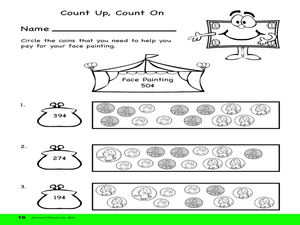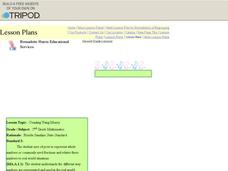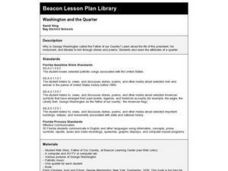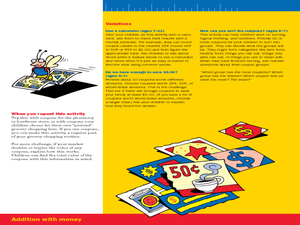Curated OER
Math In Everyday Life
Second and third graders solve word problems involving both time and money. First the class works together to solve basic addition, subtraction, multiplication, and simple fraction problems (these examples are provided). After solving...
Curated OER
Comparing Values: Comparisons Between Musical Notation and Money
Students identify ways in which the principles and subject matter of other disciplines taught in school, specifically math, are interrelated with those of music.
Curated OER
Counting Money and Making Change
Students count collections of coins and one-dollar bills. They solve problems and learn to use the dollar sign ($) with the decimal point to represent money amounts. This lesson is important as a foundation for future math concepts in...
Curated OER
Money in Action
Learners become familiar with the various coins in our money system as well as amount of each coin. They help develop their ability to count change and find different ways to show equal amounts.
Curated OER
Counting Change and Changing Coins
Second graders demonstrate how to count change. In this consumer math lesson, 2nd graders read the book The Penny Pot and identify the value of coins. Students complete a worksheet to practice counting coins.
Curated OER
Money Makes the Fair-Go-Round
Young scholars explore the value of money. In this money lesson, students investigating combining amounts of money and making change. Young scholars count sets of money and make fair trades. Resources are provided.
Curated OER
Quarters and Dollars
Second graders determine value of quarters and dollars, solve real-life problems involving money, and compare values of sets of coins and bills.
Curated OER
Making Change
Second graders explore how to incorporate a new type of technology, the cash register and/or a calculator, as a motivational tool for solving real life problems. They practice estimating money and counting back change from $20.00.
Curated OER
In Great Demand
Focusing on supply and demand, learners discuss economic principles in this lesson related to Wisconsin. After discussing supply and demand, learners answer questions related to a pizza parlor. They talk about profit, as well as other...
Curated OER
Everyday Math
Students discuss word problems involving time and money. In this mathematics lesson, students solve word problems as a class focusing on addition, subtraction, multiplication, and simple fractions. Students then make their own word...
Curated OER
Counting Using Money
Second graders count fake money by grouping like coins together. In this counting lesson plan, 2nd graders complete worksheets provided in this activity.
Curated OER
Adding Pennies, Nickels and Dimes
Students add pennies, nickels and dimes and organize the coins to display a variety of price values from real life examples. They discuss the importance of money in the day-to-day world.
Alabama Learning Exchange
Pat Brisson's Benny's Pennies
Learners listen to the book, "Benny's Pennies" and conduct math and language arts lessons to go along with the book. They demonstrate their ability to count pennies, understand proper sequence, and rewrite a story using different...
Curated OER
Making $ents
Second graders complete several activities that give them opportunities to practice and model strategies that help them count money. They read The Penny Pot storybook; they play a trading game with various coins. They participate in a...
Curated OER
Thiebaud Cake Math: Elementary
Students explore the American artist Wayne Thiebaud. They practice addition, subtraction, fractions, money problems, and classification problems by carefully examining his painting entitled Cakes. They create a bold cake painting.
Curated OER
Problem Solving
Scholars will learn to solve word problems using addition, subtraction, multiplication or division. Using a grocery store theme, they will identify the best way to solve real-life problems. There are many ways this basic lesson can be...
Curated OER
How Rich Is Rich?
Second graders read "Alexander, Who Used to Be Rich, Last Sunday" by Judith Viorst. They watch a video of the book and identify and record amounts of money mentioned in the story. They investigate money-related websites.
Curated OER
Franklin Roosevelt and the Dime
Students study about the life, presidency, monument, and tribute of Franklin Delano Roosevelt through stories and poems. They study the attributes of a dime.
Curated OER
Washington and the Quarter
Young scholars study the life of George Washington, his monument, and tributes to him through stories and poems. They study the attributes of a quarter.
Curated OER
A Penny for Your Thoughts
Students collect pennies to donate to Kiwanis International for their international effort to buy salt for children's bone development. They calculate the amount of money donated, calculate how many children will receive salt, and write...
Curated OER
Three Coins on a Table
Learners discuss the subject of coins and heads and tails. They work in groups to solve Fran's problem concentrating on the fact that the coins are in a row. Any group that finishes early can try the Extension problem.
Curated OER
How Much Do We Save?
Students use coupons to save. In this saving lesson students practice their addition, multiplication and estimating skills with dollars and cents. They investigate grocery coupons and look for ways to save money.
Curated OER
Saving and Spending
Students identify the reasons why they believe people save money. After this list, they discuss what they spend their money on and determine if the reasons for saving money change over time. In groups, they use the story of "Uncle Jed's...
Curated OER
Solving Problems
Second graders become familiar with need strategies for computation of money problems and estimating sums. In this computation instructional activity, 2nd graders solve real life problems to understand estimation and money problems.

























